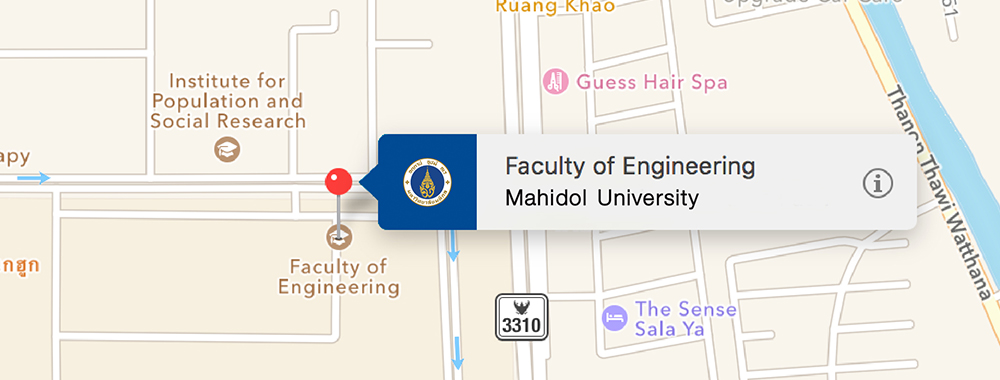Mechanical Engineering Program
Mechanical engineering is the first program of the Faculty of Engineering. Mahidol University. We aim to produce graduates with our core value called DEEP (Determined, Educated, Evolving & Professional)
Determined: Ability to set goals with the determination and responsibility to work with perseverance, effort, and patience to achieve the goal
Educated: Both basic knowledge dnd advance knowledge of Mechanical Engineering for application in problem-solving or expressing critical thinking in various fields includes
Programs
- Mechanical Engineering
Consistent with the missions of the Mahidol University and the Faculty of Engineering, the Mechanical Engineering program has established the following Program Educational Objectives (PEOs) in three major fields:
PEO1: Graduates practice their profession in Mechanical Engineering competently, effectively and with confidence.
PEO2: Graduates prosper in their chosen careers through their pursuit of advanced study and research.
PEO3: Graduates demonstrate good citizenship by serving society as responsible, professional, and ethical licensed mechanical engineers.PEO 1: Graduates apply technical knowledge and problem-solving skills, they have acquired to solve complex problems in Mechanical Engineering and to design and build Mechanical systems as well as interdisciplinary concepts such as electromechanical, robot systems.
PEO 2: Graduates employ entrepreneurial and innovative thinking skills to practice their crafts proficiently and competently in the field of Mechanics, Energy, Automation, and/or Automotive Engineering; and actively pursue new knowledge and skills through advanced learning and research in pursuit of growth in their careers.
PEO 3: Graduates practice their mechanical engineering professionally and ethically while ensuring to address applicable concerns on public safety, environmental impacts, and significant social issues.PEO 1: Knowledge Applying
Skills: Graduates apply basic knowledge and skills to solve complex mechanical engineering problems, and integrate those knowledge with other disciplines to solve problems in multidisciplinary field.
PEO 2: Technical and Professional
Skills: Graduates apply knowledges in mechanics, energy, automotive and/or automation to solve everchanging industrial problems, providing with professional skills and leadership, and conduct research and make decision according to professional standards.
PEO 3: Lifelong Learning
Skills: Graduates continuously improve their professional being, to engage in lifelong learning, and to apply their knowledge in mechanical engineering and other fields to other areas of their lives.
PEO4: Global Citizenship
Skills: Graduates exhibit entrepreneurial and innovative thinking skills, praise the values of high professional and moral ethics, integrate well and contribute to the local and global communities.SO 1: An ability to identify, formulate, and solve complex engineering problems by applying principles of engineering, science, and mathematics.
SO 2: An ability to apply engineering design to produce solutions that meet specified needs with consideration of public health, safety, and welfare, as well as global, cultural, social, environmental, and economic factors.
SO 3: An ability to communicate effectively with a range of audiences.
SO 4: An ability to recognize ethical and professional responsibilities in engineering situations and make informed judgments, which must consider the impact of engineering solutions in global, economic, environmental, and societal contexts.
SO 5: An ability to function effectively on a team whose members together provide leadership, create a collaborative and inclusive environment, establish goals, plan tasks, and meet objectives.
SO 6: An ability to develop and conduct appropriate experimentation, analyze, and interpret data, and use engineering judgment to draw conclusions.
SO 7: An ability to acquire and apply new knowledge as needed, using appropriate learning strategies.Student Enrollment
Student Graduation*
Academic Year
No of student
Academic Year
No of student
% Graduation
2013
57
2016
39
68.42
2014
81
2017
78
96.30
2015
78
2018
62
79.49
2016
95
2019
88
92.63
2017
43
2020
37
86.05
2018
59
2021
52 (Expected)
91.53
Remark: *Drop out mostly from freshman students due to changing of area of interest.



